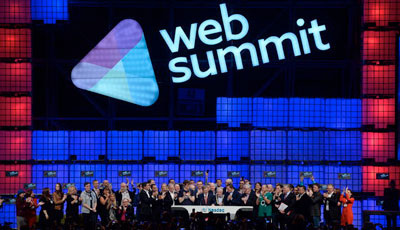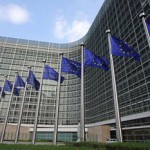Ireland Vies to Remain Silicon Valley’s Low-Tax Home Away From Home

In a sprawling conference center on the outskirts of the Irish capital, more than 20,000 people from the global tech industry gathered last week to sign deals and swap contacts.
Despite the throngs of start-ups, American heavy hitters like Peter Thiel and executives from Facebook and Twitter, talk often centered on taxes — specifically Ireland’s controversial rules that have allowed some of the world’s largest tech companies to sidestep paying billions of dollars.
“Companies are aware there’s a tightening of global tax laws,” said Brian Caulfield, a local venture capitalist, during a coffee break at the three-day Web Summit. “But what Ireland brings to the table with its low corporate tax remains extremely competitive.”
That advantage has come under threat. The Irish government agreed in October to phase out a widely used tax loophole known as the “double Irish” that experts say has saved significant money for companies like Google and Microsoft.
Policy makers in the United States and the European Union also are taking an increasingly tough stance toward countries like Ireland and Luxembourg, whose low corporate tax rates and complicated tax rules have enticed international companies like Amazon, Apple and Intel to locate their global operations there.
But despite the crackdown on tax avoidance, the open secret among many of the conferencegoers was that the recent changes to Ireland’s tax rules, many of which are expected to become law by the end of the year, still offer multiple ways for tech giants to maintain low rates.
And in the country’s Oct. 14 annual budget statement, Ireland’s lawmakers even added extra allowances related to intellectual property and employees’ salaries aimed at helping companies reduce their overall tax bills.
“We have nothing to be afraid of,” Prime Minister Enda Kenny, told reporters on Wednesday. The tax changes make the “country more attractive for companies to invest here.”
Those incentives include Ireland’s low corporate tax rate, which stands at 12.5 percent, compared with 35 percent, before deductions, in the United States.
Mr. Kenny at the Web Summit in Dublin. He said tax changes made Ireland more attractive for companies.Credit Stephen McCarthy/Sportsfile for Web Summit
Despite vocal opposition from other European politicians, who believe Ireland’s rate offers the country an unfair advantage when attracting global companies, Irish lawmakers have shown little appetite for raising the rate, which remains one of the most attractive anywhere in Europe.
Tax experts say the “double Irish” provision will remain important for many companies until it is finally phased out at the end of the decade.
The complicated structure allows large tech companies with operations in Ireland to reduce their tax bills by making royalty payments for intellectual property to a separate Irish-registered subsidiary. That unit, though incorporated in Ireland, has its home in a country that has no corporate income tax, which allows the company to significantly cut its tax burden.
“Companies have six years to use the ‘double Irish’ structure before they have to figure out what to do next,” said Joe Tynan, a tax partner at PricewaterhouseCoopers in Dublin, who added that some international companies are trying to register to use the structure before a January deadline.
And to entice companies to stay in Ireland, the government is working on plans to create a “knowledge development box” that would offer lucrative tax breaks for revenue and other royalties related to intellectual property held in the country.
The efforts, which have yet to be finalized, follow similar plans from other European countries like Britain and the Netherlands, though the European Commission is studying whether the tax breaks are legal. Padraig Cronin, a tax partner at Deloitte in Dublin, said the incentives could allow tech companies based in Ireland to pay a tax rate of as low as 5 percent on profits from patents and other intellectual property held in the country.
“No matter what anyone else introduces, we will introduce something that will be best in class,” he said.
Representatives from Apple, Google and Microsoft declined to comment on the implications that Ireland’s tax changes could have on their operations.
Critics say that Ireland’s ongoing use of these tax breaks to attract international companies places the country at odds with mounting efforts — often led by high-tax nations like France and Germany — to force tech companies to pay more taxes on their global operations.
“It’s a risky industrial strategy,” said James Stewart, a professor of finance at Trinity College Dublin, who is a vocal critic of the country’s tax policy. “Because we’re dependent on tax rewards to bring companies to Ireland, it’s hard to let that go.”
The country’s ongoing reluctance to radically alter its tax rules is linked to the crucial role that foreign investment has played in jump-starting Ireland’s fast-recovering economy, which is expected to expand by 4.6 percent this year, according to European Union statistics.
Much of that growth has come from attracting almost 1,100 international companies to Ireland. Those companies now employ about 161,000 workers across the country, more than half of whom work in industries linked to computer services.
Martin Shanahan, the chief executive of IDA Ireland, the government body tasked with attracting international companies, said that Ireland’s skilled labor force — and not just the local tax structure — was a main driver for winning foreign investment.
“Tax is something companies consider whenever they open an office, but it’s not the only thing,” he said. “We are unapologetically competitive on tax.”
Source: NYT – Ireland Vies to Remain Silicon Valley’s Low-Tax Home Away From Home





























